Judi Lynn
Judi Lynn's JournalBolivia Adds Charges Against the Leader of the 2019 Coup
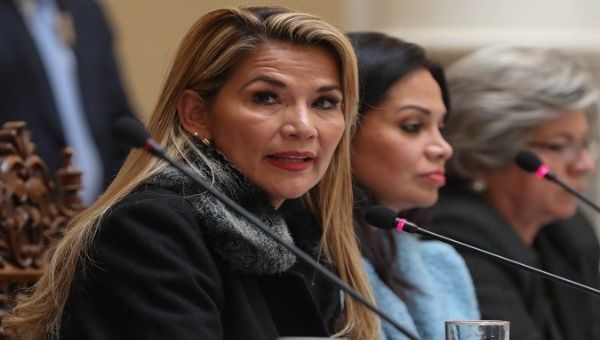
Jeanine Añez, La Paz, Bolivia, Nov. 15, 2019. | Photo: EFE
Published 19 May 2021
Jeanine Añez broke her oath of defending the Constitution when she self-declared president of the Senate and "interim president" of her country.
The Prosecutor's Office expanded the judicial investigations against Jeanine Añez to include charges of breach of her duties as a senator through arbitrary acts that violated the Bolivian constitution and laws.
The new investigation will be added to the process over terrorism, sedition, and conspiracy crimes committed during her administration (2019-2020).
"When taking office as Senator in 2015, Añez pledged to comply and enforce the law; however, she broke the oath because she acted illegally by proclaiming herself president without a corresponding quorum and a lawful mandate," lawyer Victor Nina explained.
More:
https://www.telesurenglish.net/news/Bolivia-Adds-Charges-Against-the-Leader-of-the-2019-Coup-20210519-0015.html
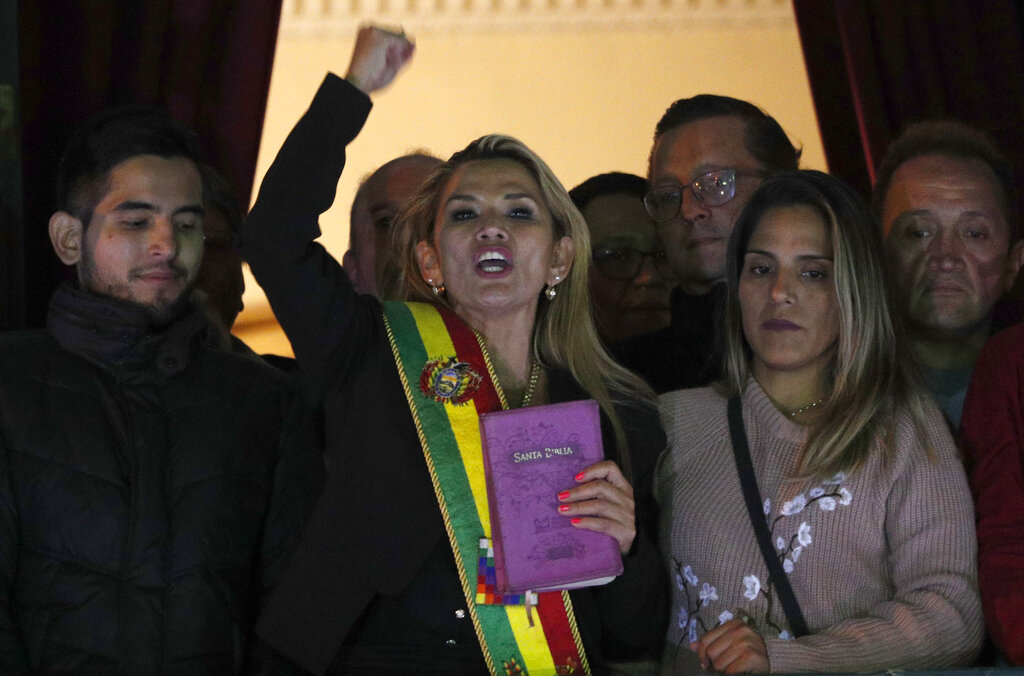

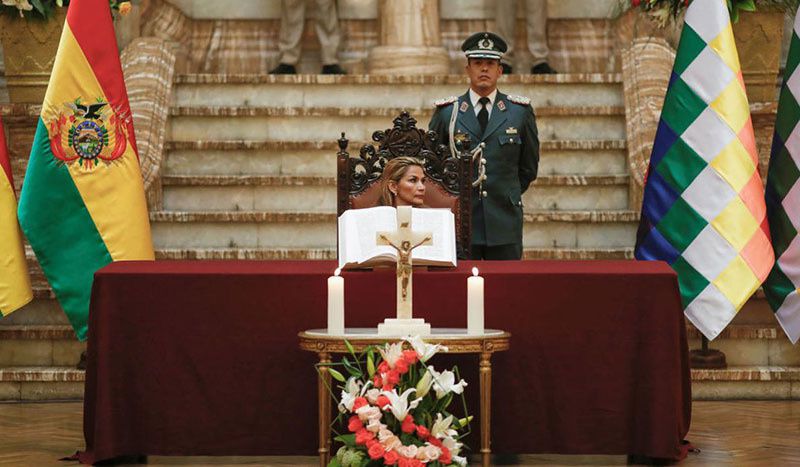
~ ~ ~
Bible vs indigenous beliefs at issue in Bolivia
By BRADY McCOMBS
January 24, 2020
LA PAZ, Bolivia (AP) — Hoisting a large leather Bible above her head, Bolivia’s new interim president delivered an emphatic message hours after Evo Morales fled under pressure, the end of a nearly 14-year presidency that celebrated the country’s indigenous religious beliefs like never before.
“The Bible has returned to the palace,” bellowed Jeanine Añez as she walked into the presidential palace where Morales had jettisoned the bible from official government ceremonies and replaced with acts honoring the Andean earth deity called the Pachamama. The conservative evangelical senator, from a region where people often scoff at Pachamama beliefs, thrust the Bible above her head and flashed a beaming smile.
While Bolivians of all walks of life are deeply divided on Morales’ legacy, his replacement, a lawyer and opposition leader who wants to make the Bible front and center in public life, is reigniting deep-rooted class and racial divisions at a time of great uncertainty in the Andean nation, where 6 in 10 identify as descendants of native peoples.
“It’s the same as 500 years ago when the Spanish came and the first thing they showed the indigenous people was the Bible,” said Jose Saravia, a civil engineer from La Paz. “It seems to me like the same thing is happening again.”
More:
https://apnews.com/article/bolivia-la-paz-caribbean-religion-weekend-reads-36976d450b3596c2951bd8ed2236311c
~ ~ ~
Actually, the first thing the Spanish invaders did was show the Native Bolivian people how quickly they could kill them, force them to dig silver or gold until they died of exhaustion or abuse, or illness, or starvation, or disease, as they instantly controlled the people, and ground them into the dust under their slimy boots.
Their descendants still treat the descendants of the original people viciously as if they don't really have a right to live in their own land, referring to them as, in Spanish, of course, "f***ing Indians", "llama abortions", etc.
Bolivians were not allowed to vote or even walk on the sidewalks until after a revolution in 1953, and today often walk for many, many miles to reach places where they may vote. Things haven't been that much better for the original Bolivians until the first Native Bolivian was elected, Evo Morales, who they conspired to overthrow, even planned to assassinate repeatedly. Each time he was somehow protected by Bolivians working to protect him.
In the meantime, the European descended fascists have not broken with their pattern of sadistic violence, and acts of hatred against the people of the country.
That's why Bolivian people, for justice's sake, absolutely need human leaders.
Colombia state terror campaign broadcast live on Twitter
by Adriaan Alsema May 10, 2021
Colombia’s President Ivan Duque and the Anti-Communist Brigade death squad tweeted their allegedly joint terror campaign live in the city of Cali.
What the purpose of the military operation allegedly carried out with the paramilitary group was other than terrorizing locals in the south of Colombia’s city is unclear.
How many people were injured and may have been killed was also not immediately clear.
Once Duque was done terrorizing the students of the Valle University, the president said that he would “listen to you and talk about the issues you complain about.”
More:
https://colombiareports.com/colombia-state-terror-campaign-broadcast-live-on-twitter/
(This seems like a completely new terror tactic. My god.)
Colombia trying to cover up attempted indigenous massacre
by Adriaan Alsema May 10, 2021
Colombia’s mass media and the Cali Police Department tried to cover up an attempted massacre of native Colombians by far-right supporters of President Ivan Duque.
At least eight indigenous protesters were injured on Sunday when heavily armed supporters of the increasingly authoritarian president indiscriminately opened fire on the buses they were driving.
The armed residents from an upscale neighborhood in the south of Cali received help from at least one policeman while preparing the massacre, according to video footage.
In order to cover up the attempted massacre, Cali Police chief Juan Carlos Rodriguez falsely accused the victims of incinerating two vehicle and falsely claimed that some were carrying firearms.
More:
https://colombiareports.com/colombia-trying-to-cover-up-attempted-indigenous-massacre/
1,000 People Were Executed by El Salvador Troops in 1981 and This American May Have Known
New evidence has emerged connecting American military advisor Allen Bruce Hazelwood to the darkest episode in El Salvador's history.
By Emily Green
May 7, 2021, 11:07am
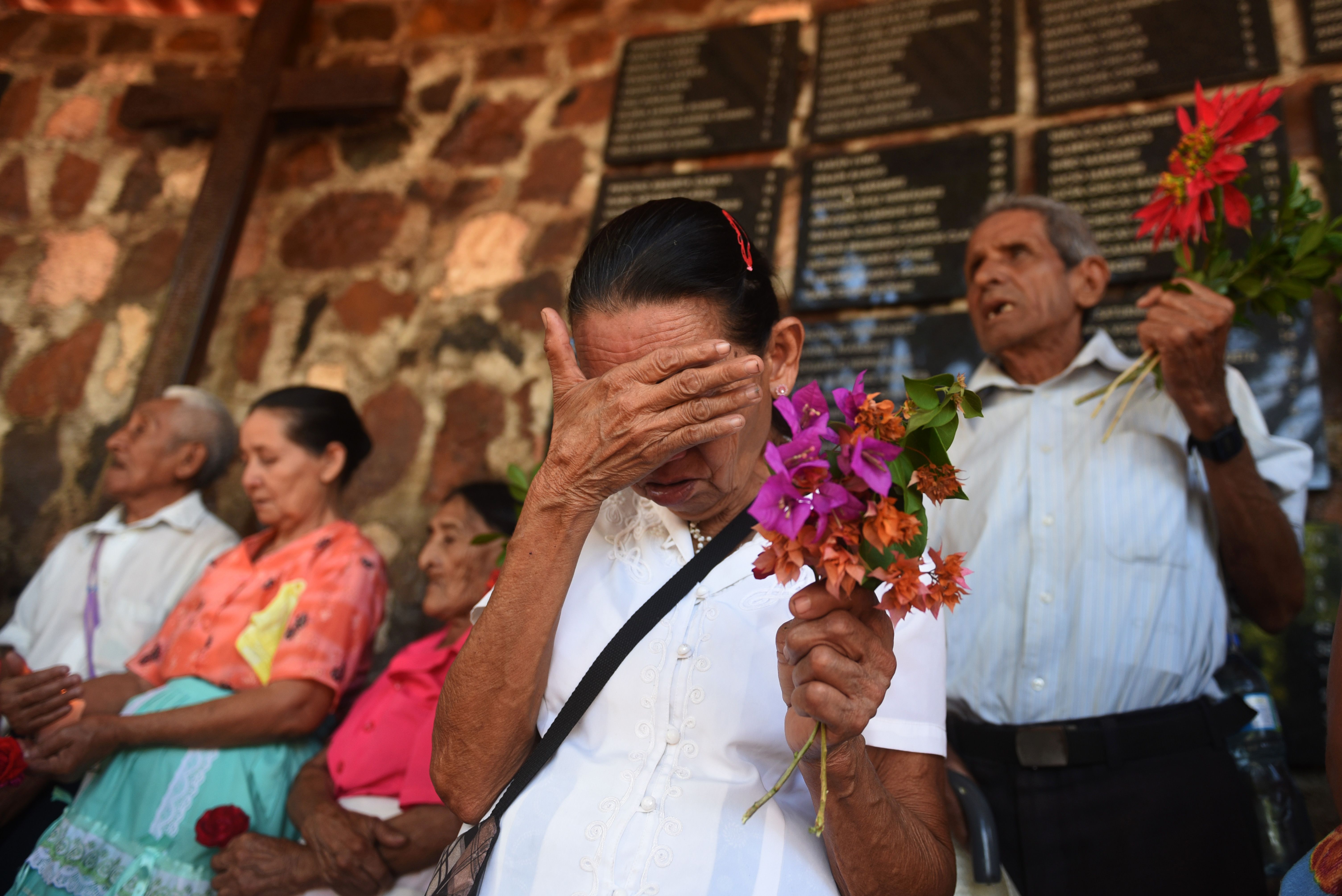
PEOPLE PARTICIPATE IN EVENTS HELD TO COMMEMORATE THE 1981 MASSACRE IN EL MOZOTE, 200 KM EAST OF SAN SALVADOR, ON DECEMBER 9, 2016. PHOTO: MARVIN RECINOS/AFP VIA GETTY IMAGES.
. . .
The execution of some 1,000 people by the military in 1981 during El Salvador’s bloody civil war is one of the country’s darkest chapters, which is now subject of one of the most anticipated and long-awaited legal proceedings in Latin American history.
. . .
“The deeper you get into it, the more lies you reveal,” said American journalist Mark Danner, who wrote an investigative book about the massacre. “And what you thought was a level of truth turns out to have a trap door underneath it.”
. . .
The facts were horrifying. It began with the Salvadoran military dropping bombs on Mozote and nearby villages, and then soldiers marched in on December 10, 1981 to interrogate residents about leftist guerrilla fighters. The following morning, the soldiers forced everyone to leave their homes and assembled them in the town square. The men and older boys were divided from the women and young children.
After murdering the men, the women were “machine gunned,” according to the Inter-American Court of Human Rights. More than 400 children under the age of 12 were executed.
More:
https://www.vice.com/en/article/88nnda/1000-people-were-executed-by-el-salvador-troops-in-1981-and-this-american-may-have-known
Ten Things to Understand about Latin America
MAY 7, 2021
BY LAURA WELLS
The United States — the land and people — will be a lot better off when the idea of US supremacy is dropped. Toward that end, and toward the goal of a better world, here are ten things for the US to understand about Latin America.
1. Threat of a good example. That is the main reason countries get on the “bad lists” of the US, not oil since not all maligned countries even have oil. The reason is that the countries do not “have the interest of the United States at heart” as CIA director George Tenet said during the US-backed 2002 coup against Venezuela’s President Hugo Chavez. The bad lists include Trump’s “Troika of Tyranny” — Cuba, Nicaragua and Venezuela — and the 30-plus countries around the globe suffering from the deadly effects of US sanctions. The US justifies sanctions by saying they are based on matters people care about deeply, such as human rights abuses and trafficking. Meanwhile, the United Nations charter clearly prohibits “unilateral coercive measures” taken by one country against another.
2. Sovereignty YES, Sanctions NO. Latin American countries are sovereign nations. They are not a “backyard” requiring US protection or interference. They have many leaders, in government and not in government, who are very intelligent with in-depth knowledge of history. They are not, as the US government and media call them, dictators, regimes, strong-men, or tyrants. To repeat, they are sovereign nations capable of choosing their own leaders. Certainly anyone familiar with US elections can believe it is possible to find better, more easily verified electoral systems outside the US, for example, Venezuela’s system, which is computerized and has paper ballots that allow for audits.
3. Constitutions get updated. Most Latin American countries are among the more than 90 countries in the world with proportional representation. PR is the key to having multiple parties, which allow voters to actually affect their governments because they can vote for the candidates most aligned with their values, not just against the worst candidates. It is said that it’s virtually impossible to eliminate from the US constitution even the based-on-slavery Electoral College, which installed two recent presidents who lost the popular vote, both Bush and Trump.
4. Term limits are not a solution. Term limits are not the great electoral reform many people believe them to be. Nicaragua and some other “bad list” Latin American governments have dispensed with them. When Venezuela held a vote to remove term limits, there were loud cries that “Hugo Chavez wants to be dictator for life!” but significantly, those accusers did not point out that Venezuela joined other nations without term limits, like the U.K., Germany, Italy, Japan, and most Scandinavian nations. When facing term limits, elected officials tend to be less focused on their current duties and more focused on positioning themselves and their campaign contributors for their next move. Terms limits came in after FDR and stopped voters from being able to re-elect presidents they still wanted. More effective electoral reforms are proportional representation, free and fair media coverage, and open debates.
More:
https://www.counterpunch.org/2021/05/07/ten-things-to-understand-about-latin-america/
UN Slams Deadly Brazil Police Operation in Favela
By Lisa Schlein
Updated May 09, 2021 03:22 PM
A woman raises her fist as Black movement activists protest in Sao Paulo against police violence after a deadly police operation in Rio de Janeiro's Jacarezinho slum, in Brazil, May 8, 2021. The banner reads: 'It was not an operation, it was a massacre'.
GENEVA - The U.N. human rights office is calling on the Brazilian government to conduct a thorough and impartial investigation into a deadly police operation in one of the favelas in Rio de Janeiro Thursday.
At least 25 people, including one policeman, were killed in a dawn raid in one of Rio de Janeiro’s shantytowns. The dramatic operation reportedly involved police officers on the ground and in a helicopter overhead shooting into the neighborhood, allegedly against members of a criminal organization.
U.N. human rights spokesman Rupert Colville, says an unknown number of people were injured, including bystanders and people inside their houses.
“It appears to be the deadliest such operation in more than a decade in Rio de Janeiro and confirms a long-standing trend of unnecessary and disproportionate use of force by police in Brazil’s poor, marginalized and predominantly Afro-Brazilian neighborhoods, known as favelas," Colville said.
More:
https://www.voanews.com/americas/un-slams-deadly-brazil-police-operation-favela
Strife in Colombia has been brewing for decades. Here's why we hear so little about it.
The Flag of Colombia
For the last week, waves of civil unrest have rocked Colombia. Intense press attention has gone alongside condemnation of the government’s response from international and regional organizations. The government now appears to be facing an existential crisis. But we need to be clear that this crisis didn’t come out of nowhere.
Colombia has suffered under one of the worst set of governments in all Latin America. This raises two obvious questions. Firstly, ‘why have we heard comparatively little from the corporate-owned media about the South American country until now?’ And ‘why does Washington seemingly give Colombia a free pass when it has such flagrant human rights problems?’
Colombians take to the streets en masse
On April 28, Colombians took to the streets to protest a government austerity measure aimed at closing budgetary gaps stemming from the coronavirus pandemic. Called the “law of sustainable solidarity”, it became instantly unpopular for putting most of burden on ordinary people. The measure imposed a regressive sales tax on essential items such as milk. There was also a tax increase on utilities such as water and electricity. Compounding the harm was a law passed in 2019 that provided generous tax benefits to the finance, oil, and mining sectors.
The right-wing government of Ivan Duque has responded with heavy-handed measures. It sent in the military to several of Colombia’s major cities, which has led to multiple deaths and disappearances as well as reports of sexual violence toward demonstrators. As this article went to press, the death toll stood at at least 30 along with scores more injuries and many still missing. Under pressure from what quickly turned into a nationwide strike, Duque’s government back-peddled and withdrew the “sustainable solidarity” measure. But by then, the protests had morphed into a wider movement against his government. Protesters, for instance, point to Duque’s poor handling of the coronavirus crisis. Colombia currently has the third-highest coronavirus death toll in Latin America after Brazil and Mexico.
But, Colombia’s social, economic, and political pathologies long predate the outbreak of the coronavirus pandemic. Colombia, for example, holds the dubious distinction of being the second most unequal country in Latin America, which is itself the most unequal region in the world. Over 60% of the population, meanwhile, works in the informal economy. Many of these workers have access only to substandard public services. For example, though Colombia’s healthcare system has been described as “near-universal”, it has nevertheless been “widely criticized for providing dramatically inferior care to the less affluent”.
As a result of the decades-long armed conflict and fallout from the ongoing ‘War on Drugs’, Colombia is also one of the most dangerous countries in the world. Though security has improved in recent years, what is often left unsaid is that this came about through a massive increase in the presence and power of state security forces that has entailed a sharp increase in human rights abuses. Colombia, for example, is one of the most dangerous countries in the world to be a journalist or social activist. Among the latter, trade union activists are some of the most at risk. Over the last decade the country has often been the number one most dangerous country to be a trade unionist.
More:
https://www.thecanary.co/global/world-analysis/2021/05/09/strife-in-colombia-has-been-brewing-for-decades-heres-why-we-hear-so-little-about-it/
A Deadly Police Raid in Rio Show How Bolsonaro's Policies Are Wreaking Havoc in Brazil
BY DAVID MIRANDA MAY 8, 2021 1:49 PM EDT
Miranda is a congressman for Rio de Janeiro state from Brazil’s Socialism and Liberty Party
When Jair Bolsonaro successfully campaigned for the Brazilian presidency in 2018, one of his central promises was to unleash the police in the favelas (slums) which are home to most of the nation’s poor and largely Black citizens. The long-time far-right Congressman, on the campaign trail, vowed greater violence in the name of fighting drug gangs and promised to provide even stronger legal immunities to police officers who kill innocents.
On Thursday, in Rio de Janeiro, Brazilians once again witnessed the horrific and savage consequences of that approach, one that strongly echoes that of Filipino strongman Rogerio Duterte. Duterte has become globally notorious (and domestically popular) for championing extra-judicial police slaughter that kills drug dealers and law-abiding, working-class residents alike. Bolsonaro, an admirer of authoritarianism wherever it emerges, has for years been eager to import that model to Brazil.
In Jacarezinho—one of Rio’s largest favelas where I grew up and my family still lives—police entered at dawn on May 6 with the stated goal of arresting drug traffickers. The invading force resembled more an army at war than a conventional police operation. They used armored helicopters, tank-like vehicles, and around two hundred heavily armed officers.
By the time they left nine hours later, at least twenty-nine people were dead. One of the dead was a police officer, the rest lived in the favela. Bolsonaro’s Vice President, Gen. Hamilton Mourão, immediately claimed, without presenting any evidence, that all the dead were “gang members.”
It was the deadliest police operation in the city’s history. Two people riding a nearby subway were wounded by stray bullets. Many of Jacarezinho’s 40,000 residents spent the day locked in their homes utterly terrorized by police forces claiming to bring security to their lives as they invaded a home of a family unrelated to the drug trade, and shot in front of their 9-year-old daughter an unarmed man who had fled into the house.
More:
https://time.com/6047032/jair-bolsonaro-crime-policies-brazils-favelas/
Trial hearings begin on Salvadoran massacre U.S. may have known about
May 6, 2021
by Rhina Guidos, Catholic News Service
WASHINGTON — An expert witness testified to the "illegal" presence of a high-ranking U.S. military adviser who may have known about the plot to kill nearly 1,000 civilians who perished in El Mozote, El Salvador, nearly 40 years ago.
Terry Karl, a Stanford University professor and expert witness who has reviewed thousands of documents on the Dec. 11, 1981, massacre, said during the late-April and early May hearings in El Salvador that the presence of U.S. Sgt. Maj. Allen Bruce Hazelwood near the scene of the massacre was not only illegal, but knowledge of it would have brought U.S. military aid to the Central American nation to a halt.
In the 1980s, the U.S. largely funded the Salvadoran government's involvement — to the tune of almost $1 million a day — in the war against armed-leftist rebels because it feared the formation of a communist bloc close to the United States.
U.S. Catholic leaders were vocal opponents of the aid, often lobbying Congress or protesting in Washington.
Officially, the war began in 1980 and ended with peace accords in 1992, although political strife had been brewing in El Salvador since the 1970s because of large-scale socioeconomic disparities.
. . .
The hearing also revealed that the United States knew Salvadoran forces used napalm against the population, even though the incendiary gel, which burns the skin, was banned for use against civilians by the United Nations in 1980.
More:
https://www.ncronline.org/news/world/trial-hearings-begin-salvadoran-massacre-us-may-have-known-about
Armed Groups Attacking Protesters in Colombia
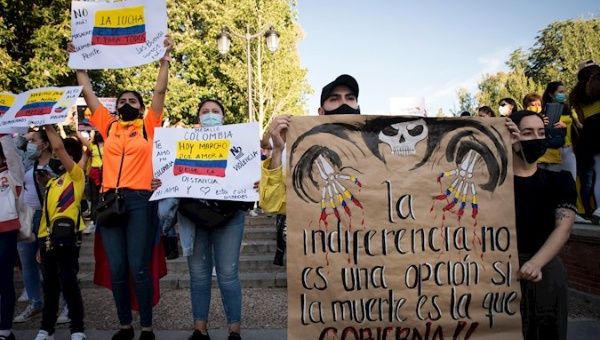
Concentration in support of the Colombian people held this Thursday in the Retiro Park, in Madrid. | Photo: EFE
Published 6 May 2021
The most recent attack occurred on Wednesday in Pereira, capital of the department of Risaralda, in the Eje Cafetero, where three young people were seriously wounded by unknown assailants who shot them from a vehicle.
Colombian social organizations and citizens have denounced that armed groups have attacked participants in protests against the Government. They demand an end to police brutality and measures to improve living conditions.
In several parts of the country, there have been reports of intimidation of demonstrators by armed men allegedly opposed to vandalism, and in some, they have even been shot at.
"Right now there are expressions of violence that completely aggravate the situation because we don't know who are the ones threatening, who are persecuting, who are shooting and who are killing," analyst Jairo Libreros, professor at the School of Government of the Externado University of Colombia, told EFE.
The most recent attack occurred on Wednesday in Pereira, capital of the department of Risaralda, in the Eje Cafetero, where three young people were seriously wounded by unknown assailants who shot them from a vehicle.
More:
https://www.telesurenglish.net/news/Armed-Groups-Attacking-Protesters-in-Colombia-20210506-0016.html
(Geez, you'd almost think there have been paramilitary groups operating in Colombia for decades, handling grotesque acts of terrorism against the people, allied closely to the right-wing military and right-wing politicians, called "paramilitaries" or more truthfully, "death squads." You'd almost remember learning sometimes they even act in tandem with the military, handling vicious tasks the military doesn't want to be associated with.)
Profile Information
Member since: 2002Number of posts: 160,516